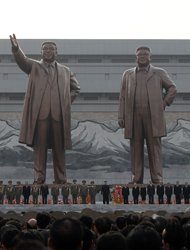print Print...
SOUTH KOREA – Robo guard on patrol in South Korean Prison
The prison system in South Korea has begun using the world’s first robot prison guard, and, according to the Asian Forum of Corrections’, it’s the future of prison security.
Lee Baik-Chul, Chairman of the Asian Forum for Correction said of the department’s decision to use robots: “The purpose to develop this kind of robot is to secure prisoner’s life and safety, and to decrease the workload of correctional officers in a poor working environment.”
The robot was developed in South Korea and is currently undergoing its first field trial. Equipped with 3D cameras and software designed to study human behavior, the robot is able to detect abnormal prisoner activity and report back to its controllers.
Mr. Lee says: “By using the 3D depth camera, it will detect every detail of actions happening inside through a window. So, when there is an unusual behavior, it’s going to analyze it and report the problem to the control system. Therefore, correctional officers will run and arrive at the scene in time.”
An officer can also use the robot’s two way wireless system to communicate with a prisoner without having to leave the control room. The robot has been designed to patrol a prison autonomously, but an IPad will allow manual control as well.
The next step, say designers, is a robot that conducts body searches although they admit, neither the technology nor the prison system is quite ready for a step that far into the future.

North Korean leader Kim Jong-Un (C) attends the unveiling ceremony of statues of former leaders Kim Il-Sung (his grandfather) and Kim Jong-Il (his father) in Pyongyang. (AFP Photo/Pedro Ugarte)
NORTH KOREA – North Korean rocket launch fails, draws condemnation
North Korea’s heralded long-range rocket test ended in failure Friday, disintegrating in mid-air soon after blast-off and plunging into the sea in a major embarrassment for the reclusive state.
The defiant launch drew condemnation from world leaders who described it as a “provocative” act that threatened regional security, despite Pyongyang insisting it was intended to put a satellite into orbit for peaceful purposes.
Some four hours after the rocket exploded over the Yellow Sea, the North admitted the satellite had failed to enter orbit, and that “scientists, technicians and experts are now looking into the cause of the failure”.
The United States and its allies slammed the exercise as a disguised ballistic missile test that contravened United Nations resolutions triggered by Pyongyang’s two nuclear tests.
“North Korea is only further isolating itself by engaging in provocative acts, and is wasting its money on weapons and propaganda displays while the North Korean people go hungry,” White House spokesman Jay Carney said.
He said the launch “violates international law and contravenes its own recent commitments,” under which Pyongyang had agreed to suspend its nuclear and missile tests in return for US food aid.
The South said it was keeping a close eye on the North “for further provocative acts such as missile tests and a nuclear test” as analysts said the humiliation could spur Pyongyang to hold a third atomic test.
The European Union joined governments in Japan and South Korea in condemning Friday’s move as a provocation that undermined peace and security in the volatile Korean peninsula and the wider region.
The North’s sole major ally, China, was more muted in its reaction, calling for restraint from all sides and saying it had not been given advance warning of the launch.
The test was supposed to have been the centerpiece of weekend commemorations to mark the centenary of the birth of North Korean founding leader Kim Il-Sung as Pyongyang cements the rule of Kim Jong-Un, who took over in December. …
North Korea had insisted the launch would not be a banned missile test and that it had every right to send the satellite up, to mark Sunday’s centenary.
Analysts said the failure would be seen as a humiliation for the untested Kim Jong-Un, who is in his late 20s, and increase the likelihood of a nuclear test in an attempt to restore national pride. …
The North, which is believed to have enough plutonium for six to eight bombs, tested atomic weapons in October 2006 and May 2009. Both were held one to three months after missile tests.
 DENMARK – Danish container shipping tycoon die
DENMARK – Danish container shipping tycoon die
COPENHAGEN – Arnold Maersk Mc-Kinney Moeller, the Dane who created the global shipping and oil conglomerate A.P. Moller-Maersk A/S, died Monday at the age of 98, his company said.
The shy Mc-Kinney Moeller, who was listed on Forbes magazine’s annual billionaire’s list, turned two small shipping companies that his father had created into a global corporate giant with 108,000 workers across 130 countries.
The Moeller-Maersk group owns the world’s biggest publicly-held container shipping group, Maersk Sealand.
Chairman Michael Pram Rasmussen said the company had “lost a businessman of international scope and a man who…can take credit for the group being among the world’s leading (businesses) and Denmark’s undisputed largest business.” …
Mc-Kinney Moeller stepped down as board chairman in 2003, at the age of 90. Five months earlier, he steered the two companies that formed the nucleus of the A.P. Moeller group through a merger, creating the current A.P. Moller-Maersk A/S.
Although he withdrew from day-to-day management in 1993, when he appointed his deputy, Jess Soederberg, as chief executive officer, Mc-Kinney Moeller was continuously involved in the company’s management. …
In high spirits but visibly frail, Mc-Kinney Moeller made his last public appearance Thursday at the group’s general assembly in Copenhagen.
“We sisters have lost a father who never betrayed either his family or his work,” Ane Maersk Mc-Kinney Uggla said on behalf of the three daughters.
(The news briefs above are from wire reports and staff reports posted at Reuters.com, YahooNews.com and Boston.com.)
Questions
1. For each of the 3 countries, give the following information:
a) location/the countries that share its borders
b) the religious breakdown of the population
c) the type of government
d) the chief of state (and head of government if different) [If monarch or dictator, since what date has he/she ruled? – include name of heir apparent for monarch]e) the population
2. For SOUTH KOREA:
a) list the who, what, where and when of the news item
b) Watch the video under “Resources” below. Do you think this would be a good idea for U.S. prisons? List 2-3 pros and cons of using robots in prisons. Explain your answer.
3. For NORTH KOREA:
a) list the who, what, where and when of the news item
b) How do the U.S. and our allies view North Korea’s rocket test? Be specific.
4. For DENMARK:
a) list the who, what, where and when of the news item
b) What type of company is Moller-Maersk?
c) What is significant about the Moeller-Maersk group?
d) How did Mr. Mc-Kinney Moeller build the business from his father?
Resources
SOUTH KOREA: Watch a video of the robot guards below (the video is from youtube; if you can’t access, use this link:
reuters.com/video/2012/04/12/robo-guard-on-patrol-in-south-korean-pri?videoId=233213268
Daily “Answers” emails are provided for Daily News Articles, Tuesday’s World Events and Friday’s News Quiz.





